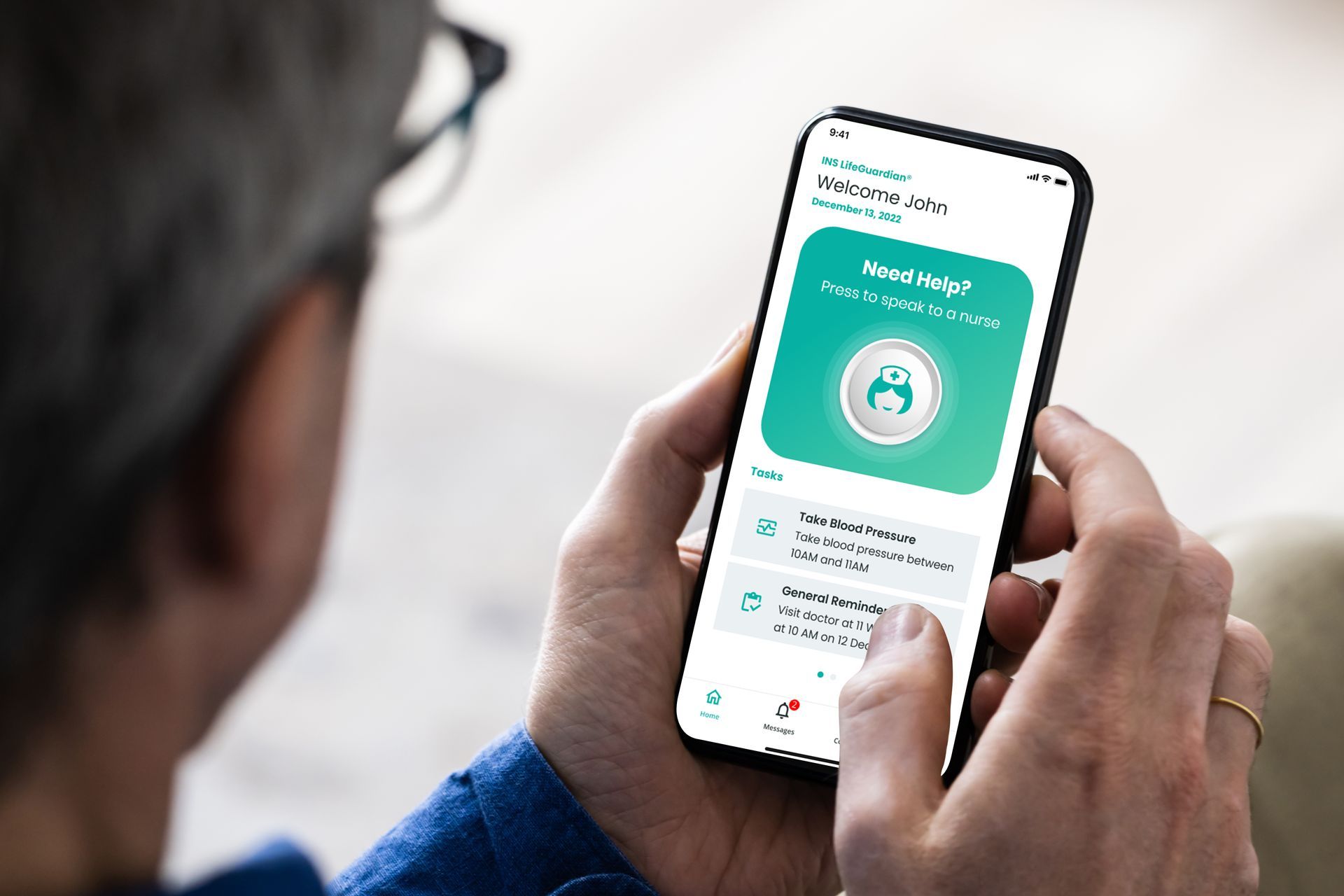INS LifeGuard
Addressing Mental Health: Providing Support With a 24/7 Free Nurse Chat and Health Line

In Australia, 50% of the population experience mental health challenges at some point in their lives while 25% of Australians report feelings of loneliness. These statistics highlight the importance of offering support to those in need, particularly given the tragic toll of 3,000 lives lost to suicide each year.
If you or a loved one is going through tough times, it's crucial to know that you're not alone, and there are resources available to provide assistance and guidance. In this blog, we’ll identify signs and indicators of mental health challenges and offer coping strategies. By sharing insights and actionable tips, we aim to empower you to overcome these challenges and lead a fulfilling life.
What is mental health?
Mental health involves the emotional, psychological, and social aspects of a person's life. It includes how individuals think, feel, and behave in response to life's challenges, as well as their ability to cope with stress, maintain relationships, and make decisions.
Depending on various factors such as genetics or brain chemistry, life experiences such as trauma or abuse, and environmental factors such as stress or social support networks, mental health can fluctuate over time.
Just like physical health, our mental health requires regular attention and care. While experiencing occasional loneliness, stress, or isolation is a normal part of life, when these feelings persist or interfere with daily functioning, it may indicate the presence of a mental health condition. To help you understand more about this, here’s a
mental health continuum that illustrates the spectrum of mental health states individuals may experience.

The mental health continuum works by helping the individual describe how they are feeling. In addition, it can also aid in determining appropriate steps to prioritise and maintain mental health in the present moment. Here’s a breakdown of the different stages of the mental health continuum:
Healthy
I feel confident in managing daily challenges, thinking clearly, and looking forward to the future. I'll stick to my healthy habits and stay close to my loved ones.
Unsettled
I've been feeling off lately. I'm easily irritated and find it hard to focus. I'm not sure what's causing these feelings.
Struggling
I've noticed more frequent mood swings lately. I'm feeling increasingly distressed and hopeless. I've been withdrawing from activities and people I usually enjoy. I believe it might be time to seek professional help.
In-crisis
I'm struggling with feelings of worthlessness and can't seem to shake off negative thoughts. Everyday tasks seem overwhelming. I require immediate professional support.
Healing
I've noticed my mood stabilising, and my thinking is clearer. I'm starting to regain my usual self. I'm also recognising which therapies are effective for me, and I plan to keep using them.
Healthy
I'm feeling stronger and more resilient now. I've gained a deeper understanding of myself and feel more prepared to manage stress in the future. I'm aware of the coping strategies that work best for me, and I'll continue to use them while prioritising self-care.
How can loneliness, isolation, and work-related stress impact one’s mental health?
Loneliness, isolation, and work-related stress can really affect how you feel inside. Here are some common challenges you might experience as a result:
Loneliness and Isolation
Depression and Anxiety
Prolonged loneliness and isolation are strongly linked to depression and anxiety, worsening negative thoughts and feelings of worthlessness due to the lack of social connection.
Cognitive Decline
Research suggests that social isolation can accelerate cognitive decline and memory loss and increase the risk of developing conditions such as Alzheimer's disease.
Physical Health Impacts
Loneliness and social isolation can trigger physical health problems, including heart disease, obesity, high blood pressure, a weakened immune system, and early mortality.
Work-related Stress
Time off Work
When work-related mental health conditions affect an individual's ability to work, they may require time off for recovery. Depending on the severity and individual circumstances, this period can vary from days to weeks, sometimes lasting up to four times longer than other types of injuries or illnesses.
Burnout
Too much stress from work can cause burnout, where you feel emotionally drained, cynical, and less effective at your job. These symptoms usually develop slowly and can affect not just your work but also how well you function in your personal life.
Physical Health Complications
Work-related stressors can also manifest as physical health problems, such as headaches, gastrointestinal issues, and sleep disturbances. Over time, these physical symptoms can worsen mental health issues and impair daily functioning.
What are some tips to effectively support one’s emotional and mental health?
Supporting mental health effectively requires a blend of strategies tailored to fit each person's unique needs. Here are some tips that can generally be helpful.
Seek Professional Help
Consult with a mental health professional such as a therapist, psychologist, or psychiatrist who can provide you with the proper diagnosis, treatment, and guidance based on your specific condition.
Develop Healthy Habits
Maintain a healthy lifestyle by getting regular exercise, eating nutritious foods, and getting enough sleep. Physical well-being can impact mental health, so try to develop healthy habits to support your mental well-being.

Manage Stress
Practice stress-reduction techniques such as mindfulness, meditation, deep breathing exercises, progressive muscle relaxation, or yoga which can all help manage your stress levels.
Therapy and Counseling
Engage in regular therapy sessions, such as Cognitive-behavioural therapy (CBT) or dialectical behaviour therapy (DBT), to develop effective coping strategies for managing your condition.
Establish a Support System
Surround yourself with supportive friends, family members, or support groups who understand your condition and can offer encouragement and assistance when needed.
Practice Self-Care
Make time for activities you enjoy and that help you relax and recharge. Engage in hobbies, spend time in nature, or indulge in activities that bring you joy.
Check Your Mental Health
Each person's mental health journey is unique, that’s why it’s important to understand that what works for one person may not work for another. To help assess your condition, use available tools like Anxiety and Depression Test (K10) and Mental Health Check-in to track your symptoms and progress over time.
Stay Connected
Stay connected with others for emotional support, reducing isolation, and fostering a sense of belonging and understanding. INS LifeGuard’s Free Nurse Chat and Information Line allows 24/7 access to a medical information and chat line, connecting users with a nurse around the clock. This service offers support for medical enquiries, welfare checks, mental health assistance, or simply a friendly conversation.
Takeaway
Mental health is a serious issue that requires ongoing attention and care. By acknowledging one’s struggles and seeking help when needed, individuals experiencing emotional and mental health challenges can begin their journey towards healing and recovery.
At INS LifeGuard, our
monitoring service is designed to provide personalised support to lonely or socially isolated individuals, as well as those who are struggling with their emotional and mental health. Whether you require reassurance and security or a family member needs health information and support, our nurses are available 24/7 to ensure your comfort and well-being. To know more about our free nurse chat and health line,
contact our friendly team today.

About
INS LifeGuard is the only 24/7 nurse on-call personal and medical monitoring in Australia. We provide monitoring technology for both in the home and on the go and can also monitor other provider's equipment. Our services are suitable for anyone wanting support to stay independent such as the elderly, those with medical conditions and disabilities plus enhancing safety and security for lone workers.
Related Articles

-
Visit our website here
I hope you enjoy reading this blog post
INS LifeGuard is the only nurse on-call personal and medical alarm service in Australia. If you would like more information about INS LifeGuards solutions, visit our website here.
I hope you enjoy reading this blog post.
INS LifeGuard is the only nurse on-call personal and medical alarm service in Australia. If you would like more information about INS LifeGuards solutions, visit our website
here.

INS LifeGuard is the only nurse on-call personal emergency response service in Australia. We have a commitment to healthcare innovation which includes personal alarms and medical alert solutions that make independence easier, safer and more enjoyable.
Our services support Seniors, Carers, Providers, NDIS Participants, Retirement Villages, DVA, Lone Workers and anyone that wants the security that help is a press of a button away.
LATEST POSTS
PO Box 485 Unanderra NSW 2526 Australia
INS LifeGuard
International Enquiries
INS CareCall supplies and monitors emergency response equipment and services, including hardware manufactured by Chiptech, Smart-Caller, SmartLink, and the LifeGuard L-Series Diallers.
Monitoring of alarms is provided through INS LifeGuard's unique Emergency Response Centre, which is the only personal alarm response centre staffed by qualified nurses. This is an important distinction.
Quicklinks
Supporting
PO Box 485 Unanderra NSW 2526 Australia
INS LifeGuard
International Enquiries












